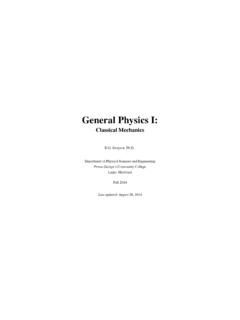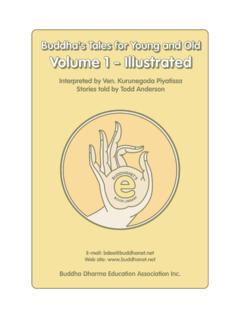Transcription of Case CCT 36/00 GARRETH ANVER PRINCE Appellant
1 CONSTITUTIONAL COURT OF SOUTH AFRICACase CCT 36/00 GARRETH ANVER PRINCEA ppellantversusTHE PRESIDENT OF THE LAW SOCIETY OF THE CAPE OF GOOD HOPEF irst RespondentTHE LAW SOCIETY OF THE CAPE OF GOOD HOPES econd RespondentTHE SECRETARY OF THE LAW SOCIETY OF THE CAPE OF GOOD HOPET hird RespondentTHE MINISTER OF JUSTICEF ourth RespondentTHE ATTORNEY-GENERAL OF THE CAPE OFGOOD HOPEF ifth RespondentHeard on:17 May 2001 Decided on :25 January 2002 JUDGMENTNGCOBO J:Introduction1]Mr GARRETH PRINCE , the Appellant , wishes to become an attorney. He has satisfied all the academic requirements for admission as The only outstanding requirement is a period of community service which he is required to perform in terms of section 2A(a)(ii) of the Attorneys In an application to register his contract of community service with the Law Society of the Cape of Good Hope (the Law Society), the second respondent, as required by section 5(2) of the Attorneys Act,3 the Appellant not only disclosed that he had two previous convictions for possession of cannabis sativa (cannabis)4 but also expressed his intention to continue using cannabis.
2 He stated that the use of cannabis was inspired by his Rastafari ]The Law Society declined to register his contract of community service. It took the view that a person who, while having two previous convictions for possession of cannabis, declares his intention to continue breaking the law, is not a fit and proper person to be admitted as an In the view of the Law Society, as long as the 1He has completed the B Iuris and LLB degrees. At the time of the launching of these proceedings he was pursuing, part-time, LLM studies in Labour Law. He has also successfully completed a course with the School for Legal Practice in partial fulfilment of the period of articles of clerkship required in terms of section 2A of the Attorneys Act 53 of Act 53 of 5(2) provides.
3 The secretary of the society concerned shall, on payment of the fees prescribed under section 80, examine any articles or contract of service lodged with him and shall, if he is satisfied that the articles are or contract of service is in order and that the council has no objection to the registration thereof, on payment of the fees so prescribed register such articles or contract of service and shall advise the principal and candidate attorney concerned of such registration in writing by certified post. 4It is also known as marijuana , hashish and dagga and the Rastafari call it ganja or The Holy Herb .5 Section 4A(b)(i) provides: A candidate attorney intending to perform community service shall submit to the secretary of the society of the province in which the community service is to be performed, the following, namely.
4 Proof to the satisfaction of the society that he .. is a fit and proper person .NGCOBO Jprohibition on the use or possession of cannabis remains on the statute books, the Appellant will consistently break the law and this will bring the attorneys profession into ]Cannabis is a dependence-producing drug, the possession or use of which is prohibited by the law, subject to very few exceptions that do not apply to the Appellant . The Appellant unsuccessfully challenged the constitutionality of this prohibition, both in the Cape of Good Hope High Court (the High Court)6 and later in the Supreme Court of Appeal (the SCA).7 Hence this ]This appeal concerns the constitutional validity of the prohibition on the use or possession of cannabis when its use or possession is inspired by religion.
5 The Appellant does not dispute that the prohibition serves a legitimate government interest. We are therefore not called upon to decide whether cannabis should be legalised or not. The constitutional complaint is that the prohibition is bad because it goes too far, bringing within its scope possession or use required by the Rastafari ]The appeal is resisted by the Attorney-General and the Minister of Health. The Law Society and the Minister of Justice abide by the decision of the as PRINCE v President of the Law Society, Cape of Good Hope and Others 1998 (8) BCLR 976 (C). Initially, the Appellant challenged the decision of the Law Society refusing to register his contract of community as PRINCE v President, Cape Law Society, and Others 2000 (3) SA 845 (SCA); 2000 (7) BCLR 823 (SCA).
6 3 History of litigation6]When the litigation commenced in the High Court, the Appellant challenged the constitutionality of the decision of the Law Society, alleging that it infringed his rights to freedom of religion,8 to dignity,9 to pursue the profession of his choice,10 and not to be subjected to unfair He sought an order reviewing and setting aside the decision of the Law Society refusing to register his contract of community service and directing the Law Society to register his contract with effect from 15 February 1997. However, by the time the matter reached this Court, the Appellant had broadened his constitutional challenge to include a challenge to section 4(b) of the Drugs and Drug Trafficking Act 140 of 1992 (the Drugs Act)12 and section 22A(10) of the Medicines and Related Substances Control Act 101 of 1965 (the Medicines Act).
7 13 It is this challenge that led to the intervention of the Minister of Justice, the Minister of Health and the ]This matter first came before this Court in November As the focus of 8 Sections 15(1) and 31(1) of the Constitution of the Republic of South Africa Act 108 of 10 of the 22 of the 9 of the below n below n 32. 44 PRINCE v President, Cape Law Society, and Others 2001 (2) SA 388 (CC); 2001 (2) BCLR 133 (CC) ( PRINCE 1).NGCOBO Jthe challenge had been on the decision of the Law Society, there was insufficient information on record to determine the constitutionality of the impugned provisions. After extensive argument, the parties were granted leave to submit further evidence in the form of affidavits. The Appellant was directed to deal, amongst other things, with the circumstances under which Rastafari use cannabis, while the respondents were directed to respond to Appellant s evidence and, in addition, deal with practical problems that may arise from the granting of a religious exemption.
8 On that occasion the Court made an order which, in pertinent part, reads: Appellant is granted leave to deliver, on or before 24 January 2001, evidence on affidavit setting out:(a)how, where, when and by whom cannabis is used within the Rastafari religion in South Africa;(b)how cannabis is obtained by Rastafari;(c)whether the Rastafari religion regulates the use and possession of cannabis by its members;(d)whether there are any internal restrictions on, and supervision of, the use of cannabis by members of the Rastafari religion; and(e)any other facts relating to the matters set forth in paras [12]-[17] of the respondents are granted leave to deliver, on or before 14 February 2001, evidence on affidavit setting out:(a)their response, if any, to the evidence submitted by the Appellant ;(b)what practical difficulties, if any, will be encountered if an exemption for the sacramental use of cannabis is allowed.
9 And(c)how a religious exemption for the personal use of cannabis would differ, in its administration and the overall enforcement of the Drugs and Drug Trafficking Act 140 of 1992 and the Medicines and Related Substances Control Act 101 of 1965, from the medical and scientific exemptions currently to be found in s 4(b) of the Drugs Act and s 522A(10) of the Medicines Act, if at all. 158]Pursuant to that order the parties have submitted a considerable body of additional factual and opinion issues9]Before addressing the merits of the appeal it is necessary to dispose of two preliminary matters. The one is an application by the Appellant to have certain material admitted in terms of Rule 30 and the other is an application by the Attorney-General to submit further evidence.
10 (a)The Rule 30 application10]Rule 3016 permits any party on appeal to canvass factual material which is relevant to the determination of the issues before the Court and which do not specifically appear on the record . However, this is subject to the condition that such 55Id at para 41. The matters set forth in paras [12]-[17] were the history of Rastafari religion, its membership, organisational structure and the role played by cannabis in its 30 reads as follows: (1)Any party to any proceedings before the Court and an amicus curiae properly admitted by the Court in any proceedings shall be entitled, in documents lodged with the registrar in terms of these rules, to canvass factual material which is relevant to the determination of the issues before the Court and which do not specifically appear on the record: Provided that such facts (a)are common cause or otherwise incontrovertible; or(b)are of an official, scientific, technical or statistical nature capable of easy verification.














